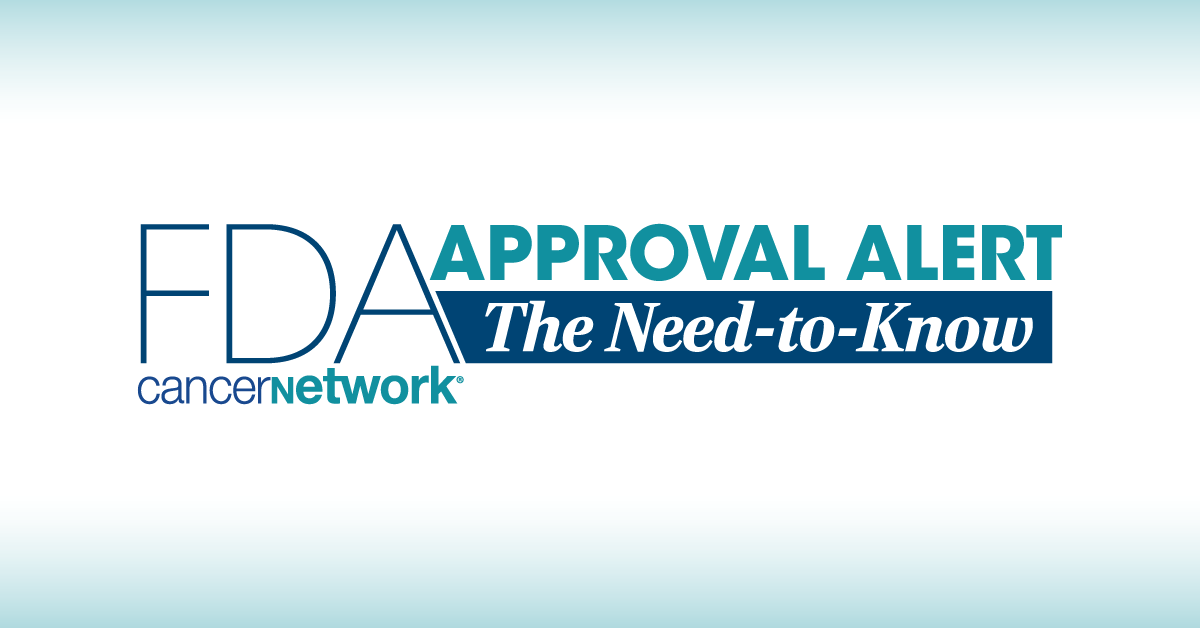FDA Approves Acalabrutinib Combo in Previously Untreated MCL
The FDA has approved acalabrutinib in previously untreated MCL based on results from the phase 3 ECHO trial.
The FDA has approved acalabrutinib in previously untreated MCL based on results from the phase 3 ECHO trial.

The FDA has approved acalabrutinib (Calquence) plus bendamustine and rituximab as a treatment option for patients with previously untreated mantle cell lymphoma (MCL) who are not eligible for autologous hematopoietic stem cell transplantation.1
In October 2024, the FDA granted acalabrutinib priority review and set a Prescription Drug User Fee Act date in the first quarter or 2025.2 It was reviewed under the initiative Project Orbis.
The FDA’s decision was informed by results from the randomized, double-blind, multicenter phase 3 ECHO trial (NCT02972840), which set out to evaluate the efficacy of the combination treatment of acalabrutinib with bendamustine (Treanda) and rituximab (Rituxan) compared with standard-of-care (SOC) chemoimmunotherapy in patients with MCL.3
“[The data from the ECHO trial] do suggest that [acalabrutinib] may be beneficial in some high-risk patients who historically would have [had poor outcomes] with just chemotherapy, and so this does give them a bit more cover in that situation, just because testing is a little bit more limited in the community setting,” Tycel Phillips, MD, an associate professor in the Division of Lymphoma, Department of Hematology and Hematopoietic Cell Transplantation at City of Hope, said in an interview with CancerNetwork®. “…This study does not have any unexplained toxicities or other events that would give a pause to using this regimen in this patient population.”
Patients who were administered the experimental acalabrutinib regimen had clinically meaningful and statistically significant improvements in progression-free survival (PFS).2 The median PFS for the acalabrutinib group was 66.4 months vs 49.6 months for the group who received SOC treatment. The risk of disease progression or death was 27.0% lower for the acalabrutinib group compared with the SOC group (HR, 0.73; 95% CI, 0.57-0.94; P = .016).
Additionally, overall survival (OS) trended favorably for patients given the acalabrutinib regimen (HR, 0.86; 95% CI, 0.65-1.13; P = .2743); data were immature at the time of analysis.
A prespecified analysis of PFS and OS censoring for COVID-19 deaths saw a significant change: PFS saw more improvement, as the risk of disease progression or death was reduced by 36% with acalabrutinib-based treatment (HR, 0.64; 95% CI, 0.48-0.84; P = .0017), and a favorable trend was observed for patients given acalabrutinib with regards to OS (HR, 0.75; 95% CI, 0.53-1.04; P = .0797).
No new safety signals were identified with acalabrutinib.
The trial’s primary end point was progression-free survival per the Lugano Classification for non-Hodgkin lymphoma defined as the time from date of randomization to disease progression or death from any cause. Secondary end points included investigator-assessed overall response rate, overall survival, independent review committee (IRC)-assessed duration of response, and IRC-assessed time to response.4
A total of 635 patients were enrolled and randomly assigned to 1 of 2 trial arms: the experimental arm, in which they received oral acalabrutinib twice per day with intravenous bendamustine on days 1 and 2 and intravenous rituximab on day 1; and the control arm, where investigators administered a matching placebo orally twice per day with intravenous bendamustine on days 1 and 2 and intravenous rituximab on day 1; cycles were repeated every 28 days.
Patients were required to have pathologically confirmed MCL, 65 years of age or more, MCL that requires treatment while having not received prior systemic anticancer therapies, an ECOG performance status of 2 or lower, and an agreement to use effective forms of contraception during the study.
Patients were excluded if they had significant cardiovascular disease such as congestive heart failure within 6 months of the first trial dose; malabsorption syndrome or disease affecting gastrointestinal function; uncontrolled active fungal, bacterial, viral, or other infections; and concurrent participation in another therapeutic clinical trial, among other criteria.
Acalabrutinib, when compared with SOC chemoimmunotherapy, is the first and only BTK inhibitor to demonstrate a favorable trend for OS in this setting.3
References
- FDA approves acalabrutinib with bendamustine and rituximab fo rpreviously untreated mantle cell lymphoma. January 16, 2024. Accessed January 16, 2024. https://shorturl.at/fTW0O
- CALQUENCE® (acalabrutinib) granted priority review in the US for patients with untreated mantle cell lymphoma. News release. AstraZeneca. October 3, 2024. Accessed December 16, 2024. https://tinyurl.com/4zjwzufc
- Calquence combination regimen demonstrated statistically significant and clinically meaningful improvement in progression-free survival in 1st-line mantle cell lymphoma in ECHO phase III trial. News release. AstraZeneca. May 2, 2024. Accessed December 16, 2024. https://tinyurl.com/py9tdkp6
- A study of BR alone versus in combination with acalabrutinib in subjects with previously untreated MCL. ClinicalTrials.gov. Updated November 29, 2024. Accessed December 16, 2024. https://tinyurl.com/ynn5x4h8
Highlighting Insights From the Marginal Zone Lymphoma Workshop
Clinicians outline the significance of the MZL Workshop, where a gathering of international experts in the field discussed updates in the disease state.